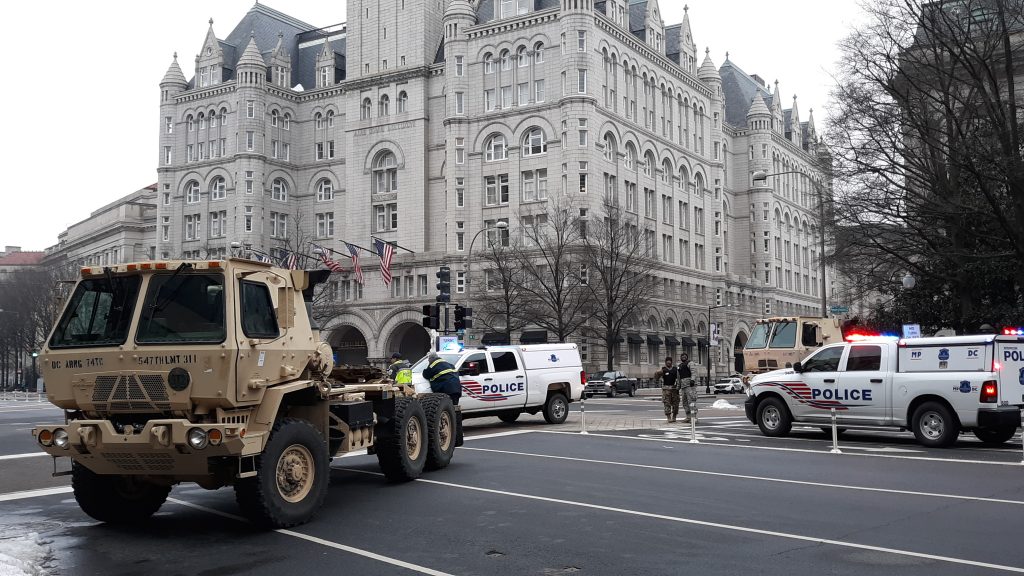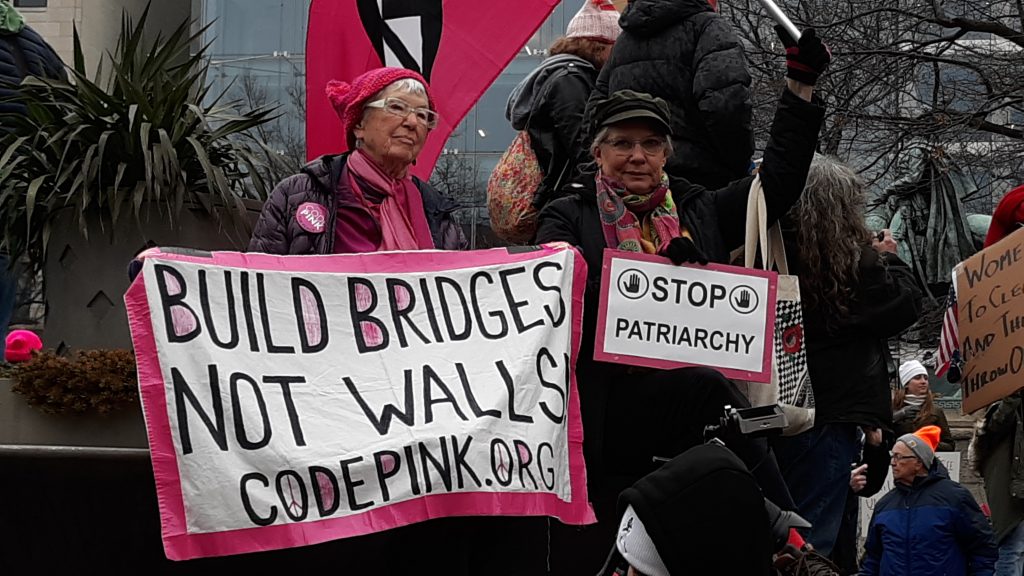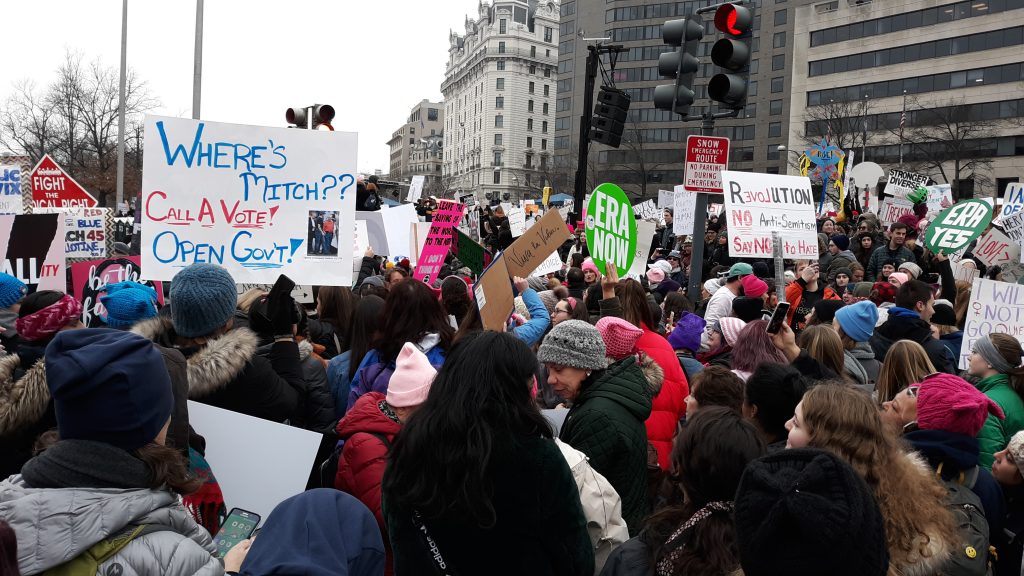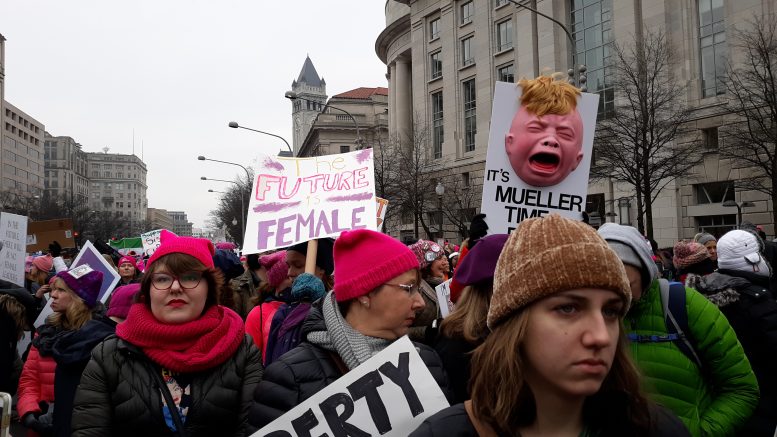By JAN LARSON McLAUGHLIN
BG Independent News
The women marching in Washington, D.C., on Saturday would like to retire their protest signs and their pink hats.
But they picked them up again this past weekend and marched in front of the Trump Hotel in the nation’s capital.
The marchers ranged from babies in strollers to older women holding signs stating, “Now you’ve pissed off Grandma.” They were joined by husbands, sons and boyfriends.
Associated Press estimated the numbers at the Women’s March in Washington, D.C., at close to 100,000 – while cities across the U.S. held their own sister marches.
The numbers were drastically lower than the first Women’s March in 2017, which hit a high of one million marchers.
Their lists of grievances were longer this year – with complaints added since the last annual march. They now had more frustrations – the Me Too movement, the addition of Brett Kavanaugh to the U.S. Supreme Court, the shutdown over the demand to build a wall on the border with Mexico.
Originally scheduled to travel past the White House, that route was rejected by authorities – so the marchers instead focused their taunts toward the Trump Hotel.

Debbie Dalke, of Bowling Green, returned for this year’s march.
“It was exhilarating,” she said. “It was very empowering.” The numbers were down, but the spirits were high. “I still thought it was so powerful. There were still people as far as I could see.”
After the march, Dalke stopped at a restaurant where a waitress thanked her for marching. “She had to work that day,” Dalke said.
“It was really great to be here and see so many other people concerned about the direction of our country,” she said.
Dawn Hubbell-Staeble, of Bowling Green, also returned to the nation’s capital for the women’s march. She was joined by a son, an exchange student from Germany and another from Spain. Hubbell-Staeble said she was aware of the controversy surrounding this year’s march, but believed it was important to show up.
“I thought it was important to come again,” she said. “It’s been two years and things have gotten worse. And this is the year of the woman.”
And while it is sad that marching is still necessary – Hubbell-Staeble was inspired by those surrounding her on the streets.
“It gives me a sense of unity. It’s not just me – there are a lot of women,” she said. “I think it’s important to be here in the seat of government.”
The signs held by the marchers revealed their concerns:
- It’s so bad, even introverts are here.
- A picture of the Statue of Liberty with the words, “Screaming internally.”
- Grab the Republicans by the ballot box.
- They tried to bury us, but they didn’t know we were seeds.
- If you’re not outraged, you’re not paying attention.
- Nasty women make history.
- Men of quality aren’t afraid of equality.
- Those people accustomed to privilege find equality oppressive.

President Donald Trump took the brunt of the protesters’ anger, with signs like:
- Can we just build a wall around Donald Trump. I’ll pay for it.
- The threat is in the White House – not the border.
- It’s Mueller time.
Or against socially conservative policies:
- You’re pro-life until the baby is transgender, sick, disabled, poor, undereducated, etc.
- Keep your rosaries off my ovaries.
Waiting for the march to begin in Freedom Plaza were two 18-year-olds, Emily Monagle and Natalie Aman, who traveled from Austin, Texas, to the nation’s capital to march for women’s rights.
“This is for my little sisters,” said Monagle, who has four younger sisters back home. “They deserve better. We made progress, but it isn’t enough.”
Monagle held her sign saying, “Here’s to strong women. May we know them. May we be them. May we raise them.”
Aman, who is a student journalist at her high school, was moved to march for those in the MeToo movement.
“I’m here marching for all the survivors of sexual assault,” she said.
Holding a sign saying “Nothing strengthens authority so much as silence,” was Amy Pondolfino, from Oneonta, New York.
“I’m here for all the reasons,” she said, listing off a few. “The racism is real. The sexism is real. The corruption is real.”
Pondolfino was joined at the march by her son, Everett, 11, who held a sign saying “Twits shouldn’t tweet.”
Everett said he decided to march after reading some articles at school about the impact of the federal shutdown on the national parks.
“They are littered. They’re full of garbage. That really bothers me,” he said.

Listening to the speakers after the march was Amy Hubbard, who lives in Washington, D.C. She is a regular at the women’s marches.
“We don’t have voting representation in Congress, so I march,” Hubbard said. “I think people need to make their voices heard about the ideals of our country. I’m about equality for all.”
Robin Trimarchi, a journalist from Columbus, Georgia, was back on Saturday after being at the first march two years ago.
“It is a troubling time,” she said. “Our presence is important. There’s power in numbers.”
At age 63, Trimarchi had hoped women would no longer need to march for rights.
“While it’s unfortunate we’re still fighting, some of this is not a surprise,” she said. “We’re teaching a new generation to go forward. It’s complex. The more we gain, the more we have to keep going. The fight expands.”
And eventually, all boats will rise, Trimachi said. But until then, she will march.
She was joined by Millie Smith, of Georgia, who was less optimistic.
“There are so many things. There are just so many things” to march for, Smith said. “And nobody’s listening.”

